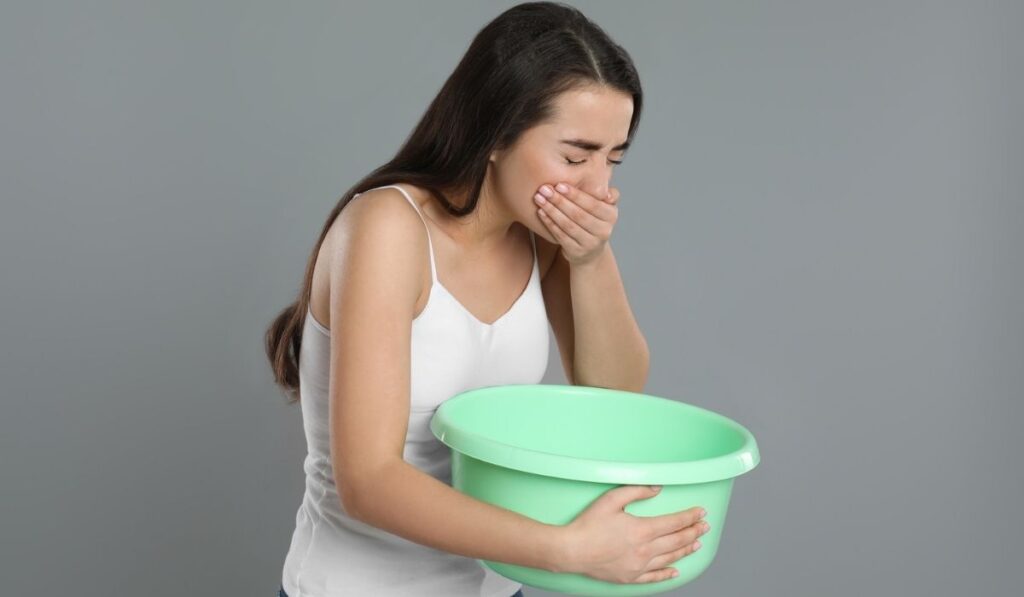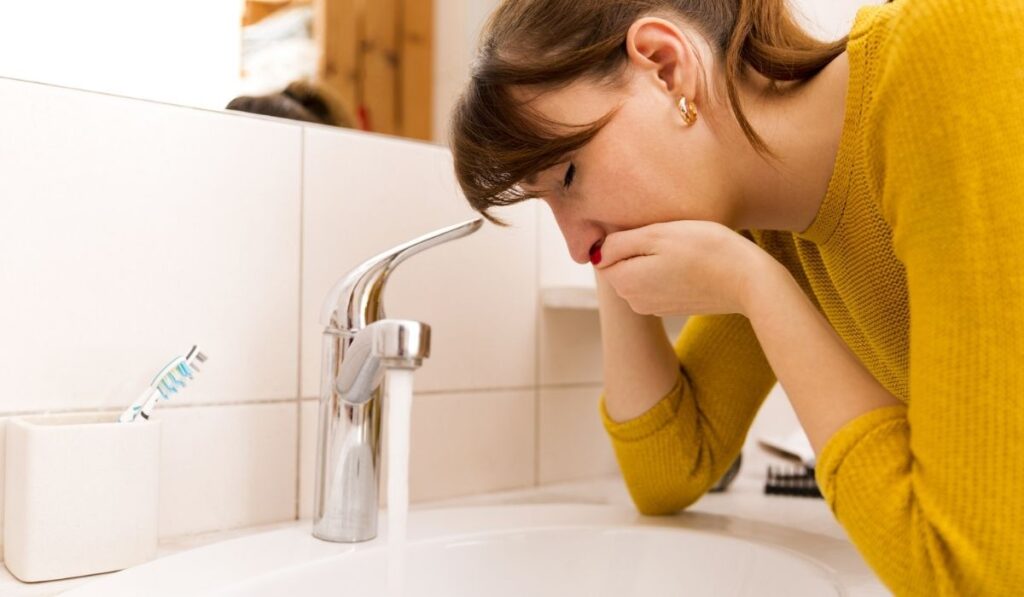Every once in a while, we all experience the unpleasant experience of throwing up. Normally, this is a natural response by your body in order to fend off some sort of threat, such as a harmful substance or irritant that you accidentally consumed. But how does throwing up affect your teeth?
Throwing up can harm your teeth because your stomach expels bile and acids that can erode tooth enamel and lead to infections, cavities, and decay. You can prevent these effects by rinsing your mouth with water immediately after vomiting and brushing your teeth at least 30 minutes later.
Vomiting can’t usually be stopped, but you can still take measures to clear your mouth of the harmful substances it brings up. The same applies to acid reflux, which has similar effects on the teeth. Read on for guidance on what to do after you throw up to protect your teeth and prevent stomach acids from causing harm.
Is Throwing Up Bad for Your Teeth?

Vomiting is never a fun experience for anyone, and unfortunately, some people may have to deal with it more often than others. Throwing up can indeed be bad for your teeth, due to the bile and acids that your stomach expels through your mouth. These substances can damage and erode the enamel of your teeth.
The enamel is the protective layer on your teeth, and it acts as a shield to protect your teeth from cavities, tooth sensitivity, and other issues. The harmful acids expelled when you throw up can start to deteriorate the enamel on your teeth.
If you throw up regularly, these harmful effects only increase, and can cause further oral health problems such as redness of mouth and tongue, dryness, sore throat, and enamel erosion. This problems are aggravated due to frequent contact of your teeth and the harmful acids found in your vomit.
Over time, the erosion can become even more severe, especially when your upper and lower teeth come into contact.
There are ways of reducing and preventing these harmful effects such as always rinsing your mouth with water and then using a mouthwash containing fluoride; this helps flush out any particles and acids left over from the vomit.
Can You Protect Your Teeth When You Vomit?
While vomiting can have some serious negative effects on your oral health, there are ways to protect your teeth from the impact of frequent vomiting.
Frequent vomiting can occur due to morning sickness, acid reflux, and other conditions, and it can pose a threat to your teeth over time. Here are some things you can do to avoid harming your teeth when throwing up:
- Rinse your mouth: Rinsing your mouth with water after throwing up helps flush out dangerous acid and other particles left over in your mouth. Rinsing also helps to restore the pH balance in your mouth, since stomach acid will throw that off.
To make your mouth even cleaner and healthier, you can use a mouthwash to rinse after using water. It helps clean your mouth and also prevents your mouth from smelling. - Don’t brush immediately: The harmful acids in your vomit can cause the enamel of your tooth to soften. For this reason, brushing right after you throw up can cause further deterioration to your teeth.
So although it is absolutely necessary to brush your teeth, especially after throwing up, just hold on for 30 minutes or so before doing so. - Apply toothpaste: Another thing you can do is smear some toothpaste on your teeth. The alkaline levels in toothpaste will help balance out the acidity from the harmful acids in your vomit and therefore reduce its harmful effects. This step is more useful if you have frequent vomiting so you can prepare the toothpaste ahead.
Should I Brush My Teeth Right After Vomiting?

The aftertaste or experience after throwing up is very unpleasant, but however bad it may seem, brushing your teeth right afterward is not a good idea.
The bile and acids expelled out from your stomach and through your mouth are both strong and harmful for your teeth. They come into contact with your teeth and soften your teeth enamel. Brushing immediately after throwing up means the brush will cause abrasion and scrape away your tooth enamel.
Damaged enamel can leave your teeth vulnerable to cavities, gum diseases, brittle teeth, and overall tooth decay. Therefore, it’s best to wait around 30 minutes after you’ve thrown up before you brush your teeth. In the meantime, you can always rinse your mouth with water.
Is Acid Reflux Bad for My Teeth?
Acid reflux is caused by gastric fluid and stomach acids coming up into the esophagus. This causes heartburn and an overall uncomfortable feeling.
The effects of acid reflux specifically start to get worse for your teeth when the acid makes its way into your mouth, where it can splash around and come into direct contact with your teeth.
The acids attack the enamel of your teeth, much like the acids in your vomit when you throw up. These acid attacks cause the enamel to erode and make your teeth more vulnerable.
However, there are some things you can do to prevent the harmful effects of acid reflux. Rinsing your mouth with plain water will clean your mouth and clear it from any of the remaining acid.
Furthermore, while it’s important to brush your teeth, you should at least hold off for half an hour. This is because the acids weaken and soften the enamel, and brushing right after experiencing acid reflux will wear away the enamel.
If you have regular acid reflux, it’s advisable to consult a physician and your dentist for a more permanent and effective method of keeping your teeth healthy and safe.


